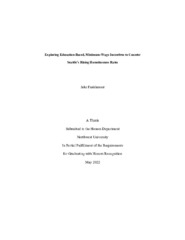Exploring Education-Based Minimum-Wage Incentives to Counter Seattle’s Rising Homelessness Rates
Abstract
Seattle currently has the third highest rate of homeless of any city in the U.S., with homeless rates only rising. To assist struggling families, the United States government has issued a new federal minimum wage to lift pay to $15 per hour. While this change helps many families, it creates difficulties for the homeless in their search for work. When wages increase, most individuals’ wages are brought up to match inflation, but at the cost of a minority losing their jobs altogether. To combat a concerning path towards rising homelessness rates, this thesis explores the theory behind implementing education-based, minimum wage incentives. The implementation of this policy aims to increase accessibility to jobs for the homeless, and to help the falling rates of college enrollment. This study does not find the exact numbers to achieve, but rather dives into the theory of the policy itself.
Description
This undergraduate thesis is submitted in partial fulfillment of the graduation requirements of the Northwest University Honors Program.
Original item type
PDF
Original extent
28 pages
Copyright
This original work is protected by copyright. Copyright is retained by the author(s). Works may be viewed, downloaded, or printed, but not reproduced or distributed without author(s) permission.


 Maintained by the Northwest University Library
Maintained by the Northwest University Library